- Joined
- Jul 8, 2024
- Messages
- 969
- Likes
- 1,846



 web.archive.org
web.archive.org



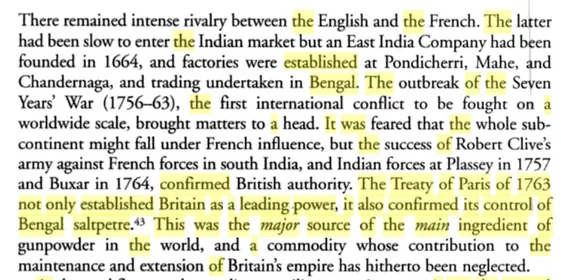

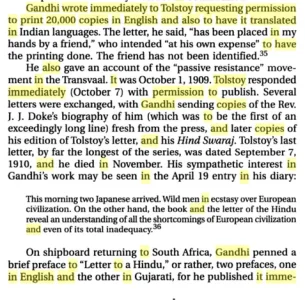
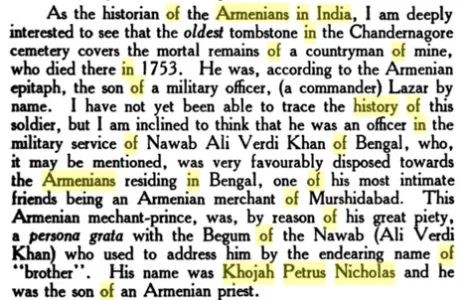
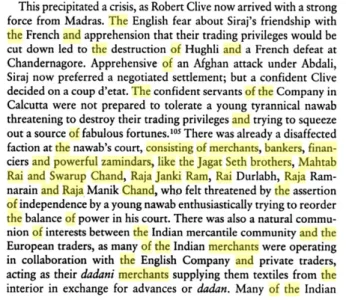
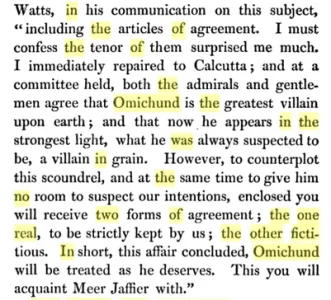

(See - https://archive.org/stream/in.ernet...85550.The-Making-Of-He-Indian-Nation_djvu.txt )As a battle, observes Panikkar, �Plassey was ridiculous. Mir Jafar, who vacillated during the engagement, came timidly round with congratulations and he was told he was now Nawab.� Plassey thus, was �a transaction, not a battle.
@swesh it appears that you have alot of materials on historical things. It's great. I would request you to share resources for the following 2,
1. Pre Sindhu-Saraswati culture along the northern river system.
2. Early humans in the subcontinent.
I was reading on early human movement into the subcontinent and that AASI is the base genetic pool of all people in the subcontinent, developed from a proto-AASI which the first Africans came with and The erectus/heidelbergensis.
The early sapiens moved out of Africa, hugging the coastal Peninsular Arabia, reached Mehrangarh via the Makaran. From their they moved into Gujarat and the southern states.
However once they entered here they didn't proliferated to the entire subcontinent! Or atleast the movement was very limited. They remained hunter gatherers and forager till they interacted with Iranian Neolithic Pastoralist (Zagrosian farmers).
What I want to know is that why generations after generations of humans in the subcontinent never developed any expeditionary prowess or fighting capability? You see the AASI being completely content with life here. The IVC people again living without much weapons. Every other human ancestor was moving and developing rapidly but ours were not. The Sino-Tibetans, Austroasiatics, Neolithic Iranian farmers, Sinthasta/Andronovo Steppe charioteer, Chinese everyone was developing either agriculture or mobility or weapons.
It feels like the same in present day also. We developed because others were developing. There's no urgency to evolve, neither then nor now. Just like how the AASI people stayed, our people do the same now. The Baboon joke is now ancient reality.
Progressive Writers' Association
Location
Nanking Restaurant
Denmark Street
London, WC2H 8LX
United Kingdom
See map: Google Maps
Other names:
Progressive Writers' Group
All-India Progressive Writers' Association
Date began:
24 Nov 1934
Date ended:
01 Jan 1956
Precise date ended unknown:
Y
About:
The Progressive Writers’ Association was established in London in 1935 by Indian writers and intellectuals, with the encouragement and support of some British literary figures. It was in the Nanking Restaurant in central London that a group of writers, including Mulk Raj Anand, Sajjad Zaheer and Jyotirmaya Ghosh drafted a manifesto which stated their aims and objectives: ‘Radical changes are taking place in Indian society…We believe that the new literature of India must deal with the basic problems of our existence to-day – the problems of hunger and poverty, social backwardness, and political subjection. All that drags us down to passivity, inaction and un-reason we reject as re-actionary. All that arouses in us the critical spirit, which examines institutions and customs in the light of reason, which helps us to act, to organize ourselves, to transform, we accept as progressive’ (Anand, pp. 20-21). Comprising mainly Oxford, Cambridge and London university students, the group met once or twice a month in London to discuss and criticize articles and stories.
The PWA built on the foundation of the controversial collection of stories titled Anghare, published in 1932 and edited by Sajjad Zaheer, with contributions also from Ahmed Ali, Mahmuduzzafar and Rashid Jahan. This volume, which provoked considerable hostility in India and was eventually banned because of its political radicalism and also, according to some, obscenity, was influenced by the radical and literary avant-garde movements in Britain, where both Zaheer and Ali had spent some time studying.
In his memoirs, Zaheer claims the leftist writer Ralph Fox was particularly influential in encouraging the formal organization of the group in London. Anand and Zaheer’s attendance of the International Congress for the Defence of Culture in Paris on 21-6 June 1935, with its emphasis on freedom of expression and the interrelationship between art and society, was also an influence. On the peripheries of this congress, Anand went on to present an address at the Conference of the International Association of Writers for the Defence of Culture in London on 19-23 June 1936. The meeting was organized by the International Association of Writers for the Defence of Culture which aimed to stimulate translations and seek publication of works which were censored in the country of the author, as well as to set up a foundation for a world award, and fight, through culture, against war and fascism. Anand and Zaheer internalized much of what was said at these congresses which shaped the central issues of concern for the PWA.
In 1935, Zaheer left London for India via Paris taking the beginnings of the organization back to India for development. The All-India Progressive Writers’ Association had its official inaugural meeting in Lucknow on 9-10 April 1936, with the writer Premchand presiding. The organization continued to campaign for independence and advocate social equality through their writings. It was unfortunately riven by tensions between a desire to strengthen the links of the organization with Communism, and an opposition to this. Those in the latter camp, such as Ahmed Ali, voiced the dangers of the reduction of literature to a vehicle for propaganda. The PWA continued after independence but is said to have lost some of its energy in its later years.
Key individuals:
Ahmed Ali
Mulk Raj Anand
Sajjad Zaheer
Key Individuals' Details:
Ahmed Ali (founding member, contributed to Anghare), Mulk Raj Anand (founding member, drafted manifesto), Hajrah Begum, Prem Chand (first President), Ismat Chugtai, Anil D’Silva, Faiz Ahmed Faiz, Jyotirmaya Ghosh (founding member, helped to draft manifesto), Rashid Jahan (founding member, contributed to Anghare), Mahmuduzzafar (founding member, contributed to Anghare), Saadat Hasan Manto, Taseer (attended London meetings), Sajjad Zaheer (founding member, edited Anghare and helped to draft manfesto).
Connections:
Suniti Kumar Chatterji, E. M. Forster, Ralph Fox, Attia Hosain, Aldous Huxley, Mohammed Ali Jinnah, Herbert Read, John Strachey.
Other related organizations:
Communist Party of Great Britain, International Association of Writers for the Defence of Culture.
Involved in events details:
Founding meeting; Nanking Restaurant, London; 24 November 1934.
International Congress for the Defence of Culture, Paris; 21-6 June 1935 (Anand and Zaheer attend; formative to aims of association).
Official inauguration of the All-India Progressive Writers’ Association, Lucknow, April 1936.
Conference of International Association of Writers for the Defence of Culture, London; 19-23 June 1936 (Anand presents address).
Published works:
New Indian Literature 1 (London, 1936)
Zaheer, Sajjad (ed.) Anghare (‘Burning Coals’) (1932)
Secondary works:
Anand, Mulk Raj, ‘On the Progressive Writers’ Movement’, in S. Pradhan (ed.) Marxist Cultural Movement in India, Vol. 1 (Calcutta: National Book Agency, 1979)
Coppola, Carlo, ‘The All-India Progressive Writers Association: The European Phase’, in Coppola (ed.) Marxist Influences and South Asian Literature, Vol. 1 (Winter 1974; Asian Studies Center, Michigan State University, East Lansing, Michigan), pp. 1-34
Gopal, Priyamvada, Literary Radicalism in India: Gender, Nation and the Transition to Independence (London and New York: Routledge, 2005)
Zaheer, Sajjad, The Light: The History of the Movement for Progressive Literature in the Indo-Pakistan Subcontinent (Oxford: Oxford University Press, 2006)
Example:
Zaheer, Sajjad, ‘Reminiscences’, in S. Pradhan (ed.) Marxist Cultural Movement in India, Vol. 1 (Calcutta: National Book Agency, 1979)
Content:
In this piece, Zaheer recalls the formation and development of the Progressive Writers’ Association.
Extract:
We knew from the beginning that living in London we could neither influence Indian literature nor create any good literature ourselves. Side by side with our realising the advantages of forming the association in London, this feeling was strengthened. A few exiled Indians could do little more than draw up plans among themselves and produce an orphanlike literature under the influence of European culture. The most important thing that we learnt in Europe was that a progressive writers’ movement could bear fruits only when it is propagated in various languages and when the writers of India realise the necessity of this movement and put into practice its aims and objects. The best that the London Association could do was to put us in contact with the progressive literary movements abroad, to represent Indian literature in the West and to interpret for India the thoughts of Western writers and the social problems which were profoundly influencing Western literature.
Relevance:
This passage outlines both the importance and the limitations of the location of the foundation of the PWA in London. London was formative to the Association in so far as the European avant-garde movement encountered there by its protagonists, as well as European political events (i.e., the rise of Fascism), instigated and helped to shape its development. Further, the distance of London from India arguably enabled the articulation of a more radical and critical politics than would have been possible within India. However, Zaheer’s notion of an ‘orphanlike’ literature, or a literature in exile, highlights the problematic detachment of the production in Britain of a socially and politically engaged Indian literature from its key concerns and preoccupations.
Source: https://www5.open.ac.uk/research-projects/making-britain/content/progressive-writers-association
In 1837A.D. the site of the town of Sirsa, Once a populous and flourishing mart, was wholly deserted. There was no village, not even a single inhabited hut, though the brick walls of shores of houses, uninhabited since the famine of 1783, were still standing. But the traditions of its former prosperity were not forgotten, and numerous merchants residing in the neighboring Rajputana States repeatedly urged captain Thorsby to restore the town. Soon after resuming charge of the district he took up the scheme and applied for sanction, and the Lieutenant-Governor in according his hearty approval remarked that the recovery of the Bhatt territory from a state of waste and its conversion in to a populous country was the Principal object contemplated in the nomination of a separate Superintendent for that tract, and that the restoration of the old town of Sirsa was likely to greatly further this object. In January 1838 Captain Thorsby called together the merchants and others who wished to settle in the new town, and made a commencement in the uninhabited jungle to the east of where the old town of Sirsa was. This site was chosen because of the good quality of the water, the number of old masonry wells in the neighborhood the proximity of the old fort with its in exhaustible supply of good brunt bricks, and the associations and traditions connected with the old town of Sirsa. The high Jungle which than covered the site was cleared away, the lines of the walls and streets were marked out by bamboos and flags, and the work was at once commenced by large gangs of convicts and numerous free laborers. The town was laid out as a square, crossed by broad streets at right angles to each other, and thus presents an appearance of regularity very seldom seen in an Indian town. A ditch and rampart were made round it in order to afford the protection which the merchants thought necessary in the state of the country; building sites were allotted to the numerous applicant, and notwithstanding such difficulties as were caused by the drought of 1838 and the visitation of cholera, within a year many hundreds of building had been finished and the foundation of about two thousand altogether had been laid, the total cost to Government being only about Rs. 6,000. The town continued to grow in size and importance as the surrounding country become more fully colonized. It was soon made the head-quarters of the Bhatti Territory, and become the great emporium for the trade of the neighborhood, and by collection large stores of grain made the country much safer against sudden scarcities. Owing to the arid nature of the country and the want of irrigation there are few trees round the town or in its immediate neighbourhood. In addition to the native town there is a railway settlement on the north side of the line, containing the residence of the railway officials and subordinates. |


